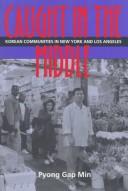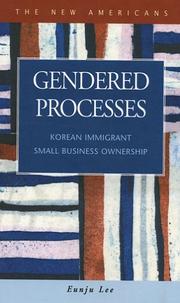| Listing 1 - 2 of 2 |
Sort by
|

ISBN: 0520917693 0585053537 9780520917699 9780585053530 0520204883 0520204891 Year: 1997 Publisher: Berkeley, CA : University of California Press,
Abstract | Keywords | Export | Availability | Bookmark
 Loading...
Loading...Choose an application
- Reference Manager
- EndNote
- RefWorks (Direct export to RefWorks)
In this unflinching exploration of one of the most politically charged topics of our time, Pyong Gap Min investigates the racial dynamics that exist between Korean merchants, the African American community, and white society in general. Focusing on hostility toward Korean merchants in New York and Los Angeles, Min explains how the "middleman" economic role Koreans often occupy-between low-income, minority customers on the one hand and large corporate suppliers on the other-leads to conflicts with other groups. Further, Min shows how ethnic conflicts strengthen ties within Korean communities as Koreans organize to protect themselves and their businesses.Min scrutinizes the targeting of Korean businesses during the 1992 Los Angeles riots and the 1990 African American boycotts of Korean stores in Brooklyn. He explores Korean merchants' relationships with each other as well as with Latin American employees, Jewish suppliers and landlords, and government agencies. In each case, his nuanced analysis reveals how Korean communities respond to general scapegoating through collective action, political mobilization, and other strategies.Fluent in Korean, Min draws from previously unutilized sources, including Korean American newspapers and in-depth interviews with immigrants. His findings belie the media's sensationalistic coverage of African American-Korean conflicts. Instead, Caught in the Middle yields a sophisticated and clear-sighted understanding of the lives and challenges of immigrant merchants in America.
Korean Americans --- Korean American business enterprises --- Business enterprises, Korean American --- Korean American-owned business enterprises --- Business enterprises --- Ethnology --- Koreans --- New York (N.Y.) --- Los Angeles (Calif.) --- Race relations. --- E-books --- Minority Business Enterprises --- Social Science --- Business & Economics --- California --- Los Angeles. --- New York (State) --- New York.

ISBN: 1593321236 1593322798 9781593322793 9781593321239 Year: 2006 Publisher: New York LFB Scholarly Pub.
Abstract | Keywords | Export | Availability | Bookmark
 Loading...
Loading...Choose an application
- Reference Manager
- EndNote
- RefWorks (Direct export to RefWorks)
Korean American business enterprises --- Family-owned business enterprises --- Korean American businesspeople --- Women-owned business enterprises --- Korean American women --- Women foreign workers --- Sex discrimination against women --- Small business --- Social conditions --- Businesses, Small --- Medium-sized business --- Micro-businesses --- Microbusinesses --- Microenterprises --- Small and medium-sized business --- Small and medium-sized enterprises --- Small businesses --- SMEs (Small business) --- Discrimination against women --- Subordination of women --- Women, Discrimination against --- Foreign women workers --- Women alien labor --- Migrant women labor (Foreign workers) --- Migrant women workers (Foreign workers) --- Women migrant labor (Foreign workers) --- Women migrant workers (Foreign workers) --- Women, Korean American --- Businesspeople, Korean American --- Business enterprises, Family-owned --- Family business --- Family businesses --- Family enterprises --- Family firms --- Business enterprises, Korean American --- Korean American-owned business enterprises --- Business --- Business enterprises --- Industries --- Feminism --- Sex discrimination --- Women's rights --- Male domination (Social structure) --- Foreign workers --- Women employees --- Women --- Businesswomen --- Businesspeople --- Size
| Listing 1 - 2 of 2 |
Sort by
|

 Search
Search Feedback
Feedback About UniCat
About UniCat  Help
Help News
News